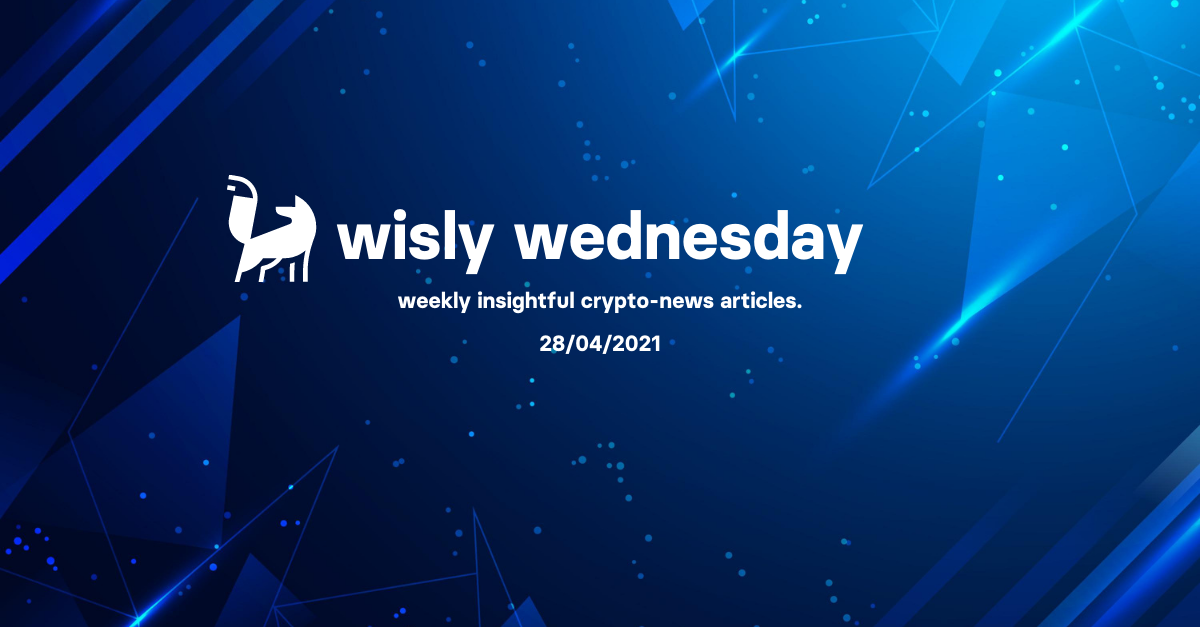It’s been another interesting week in the world of crypto with some fascinating developments taking place. Reebok joins the NFT market; Ireland’s crypto businesses are now obligated to regulatory oversight; Binance plans to launch stock tokens for MicroStrategy, Apple and Microsoft; Indonesia plans to tax cryptocurrency transactions and the Central bank of Iran authorises for imports to be paid with cryptocurrencies.
Reebok joins the NFT market based on footwear

Reebok has introduced a new non-fungible token (NFT) collection that is based on its footwear. On Monday, 26 April, they revealed via Twitter that they had minted 200 of these limited edition NFTs that they plan to sell on the Wax Atomic Hub platform. These limited edition NFTs are called X NST2 and are collector items.
Reebok now joins a growing list of major names to dabble in the blockchain sector. Many of these NFTs are selling anywhere between $500 and $2000, with some reaching values as high as $20,000. It is uncertain how long these NFTs will last as they usually get snapped up in no time. The crypto community appears to have responded positively to the news with many sharing joyful sentiments over Reebok’s arrival on the scene. Exciting times ahead!
Crypto companies in Ireland must now comply with money laundering laws

Crypto firms that operate in Ireland must now register with the Central Bank of Ireland in order to continue with their business. Failure to do so will be a criminal offence. All Irish crypto firms have, for the first time, become subject to regulatory oversight and must now observe anti-money laundering guidelines as stipulated by the European Union (EU).
On 23 April 2021, the Anti-Money Laundering Directive of the EU was transposed into Irish law through the Criminal Justice Money Laundering and Terrorist Financing Amendment Act of 2021. What this means is that businesses that operate with crypto assets and custodial wallet providers – referred to as Virtual Asset Service Providers (VASPs) – and the firms that service VASPs must adhere to the same regulatory standards that traditional financial companies do.
Irish VASPs have three months to register with the Central Bank of Ireland together with a complete due diligence check on their clients. This would include identity verification, accountability for the origin and destination of their digital assets, and reporting of any suspicious financial activity. Ireland previously had no crypto regulation which enabled traders to invest in digital assets anonymously. VASPs who fail to comply with this directive will be subject to stiff financial penalties or closure.
Binance plans launch of stock tokens for MicroStrategy, Apple and Microsoft

Leading crypto asset exchange, Binance, plans to list three new stock tokens in the next week. This comes hot off the heels of the launch of tokens for Tesla and Coinbase recently. Monday’s announcement revealed that Binance is planning to launch tokenised stock pairings for established business intelligence conglomerate, MicroStrategy, as well as multinational tech giants, Apple and Microsoft.
With this news, users have the ability to trade fractionalised units of these share tokens and will have a minimum trade size set at one-hundredth of a token. Binance added that its stocks are supported by a depository portfolio of underlying securities that are held by CM-Equity AG, a German financial services provider. Users can only trade tokens against Binance’s stablecoin, Binance USD (BUSD), and will observe traditional stock trading hours.
CM-Equity restricts some jurisdictions from trading in Binance’s stock tokens and residents from mainland China, Turkey and the US, amongst others, will be prohibited.
Indonesia plans to tax cryptocurrency transactions
The Commodity Futures Trade Regulatory Agency (Bappebti) in Indonesia has made plans to tax cryptocurrency transactions as a growing number of citizens flock towards digital assets. According to Bappebti, the Indonesian government is expected to impose a final income tax on all virtual currency transactions. This tax will be automatically levied by the cryptocurrency trading platforms that are registered with Bappebti.
This decision is currently under internal review at Bappebti and a tax rate has not been determined as yet. Bappebti issued a regulation in December 2020 that recognised 229 cryptocurrencies that users could legally trade. Moreover, in February 2021, they issued another regulation that officially recognised 13 platforms as licenced cryptocurrency trading platforms. Bappebti has, however, recently imposed stronger control over cryptocurrency trading amidst the frenzy in digital assets worldwide.
One of Indonesia’s largest crypto exchange platforms, Indodax, showed support for the purported tax plan envisaging that investors would not be overburdened by its presence. Executive chairman of the Indonesian Crypto Asset Traders Association, Teguh Kurniawan Harmanda, was not as positive and said, “We hope the tax rate will not be too high, or we fear that investors may turn to investing in crypto assets through illegal channels, which would be harmful.”
Iran allows imports to be paid with cryptocurrency

The Central Bank of Iran has given currency exchangers and banks the green light to use cryptocurrencies to pay for imports. Only cryptocurrencies that are mined by licenced crypto miners in Iran are eligible for payment of imports. All banks and currency exchange offices have received notification regarding the regulatory framework for cryptocurrency payments.
The Iranian government has slowly warmed to cryptocurrency adoption in the country with this amendment to its cryptocurrency regulations, backed by the Central Bank and Ministry of Energy. This now allows the Central Bank of Iran to pay for imports with BTC that is legally mined in Iran through licenced crypto miners. The requirement is that miners must sell their coins directly to the Central Bank of Iran.
Iran has so far issued over 1,000 licences to crypto miners in recent times. Iranian power plants are permitted to mine cryptocurrencies and licenced bitcoin miners now have exclusive access to the electricity generated from three of these power plants. Iran has also clamped down on illegal crypto miners, with over 1,600 mining farms shut down in January 2021.
Any data, text or other content on this page is provided as general market information and not as investment advice. Past performance is not necessarily an indicator of future results.




